Understanding the Essential Roles Behind Death Investigation
Who works at a morgue encompasses a diverse team of medical, forensic, and support professionals who ensure dignified care of the deceased while supporting grieving families and legal investigations. The primary roles include:
- Forensic Pathologists - Medical doctors who determine cause and manner of death
- Coroners/Medical Examiners - Legal officials who investigate deaths and order autopsies
- Morgue Technicians (Dieners) - Assistants who prepare bodies and maintain the facility
- Forensic Science Technicians - Specialists who collect and analyze evidence
- Administrative Staff - Personnel who handle records, families, and coordination
- Support Professionals - Embalmers, funeral directors, and grief counselors
A morgue serves as more than just a storage facility for human remains. It functions as a critical hub where bodies await identification, autopsy, or release to families. These facilities maintain strict temperature controls between 36-39°F to slow decomposition, allowing families time to make arrangements while preserving evidence for legal investigations.
The work environment demands both technical expertise and emotional resilience. As one Reddit morgue worker shared, "I love it so much as I have a purpose now," highlighting how professionals find meaning in providing dignified care during families' most difficult moments.
Modern morgues operate 24/7 with specialized equipment including positive-temperature chambers for short-term storage and negative-temperature freezers for long-term preservation. Staff follow strict safety protocols to protect against biological hazards while maintaining the chain of custody for legal cases.
We're American Mortuary Coolers, a national-level mortuary cooler supplier with extensive experience working alongside the professionals who works at a morgue daily. Through decades of providing essential refrigeration equipment to funeral homes and medical facilities, we've gained deep insight into the critical roles that keep these facilities running smoothly.
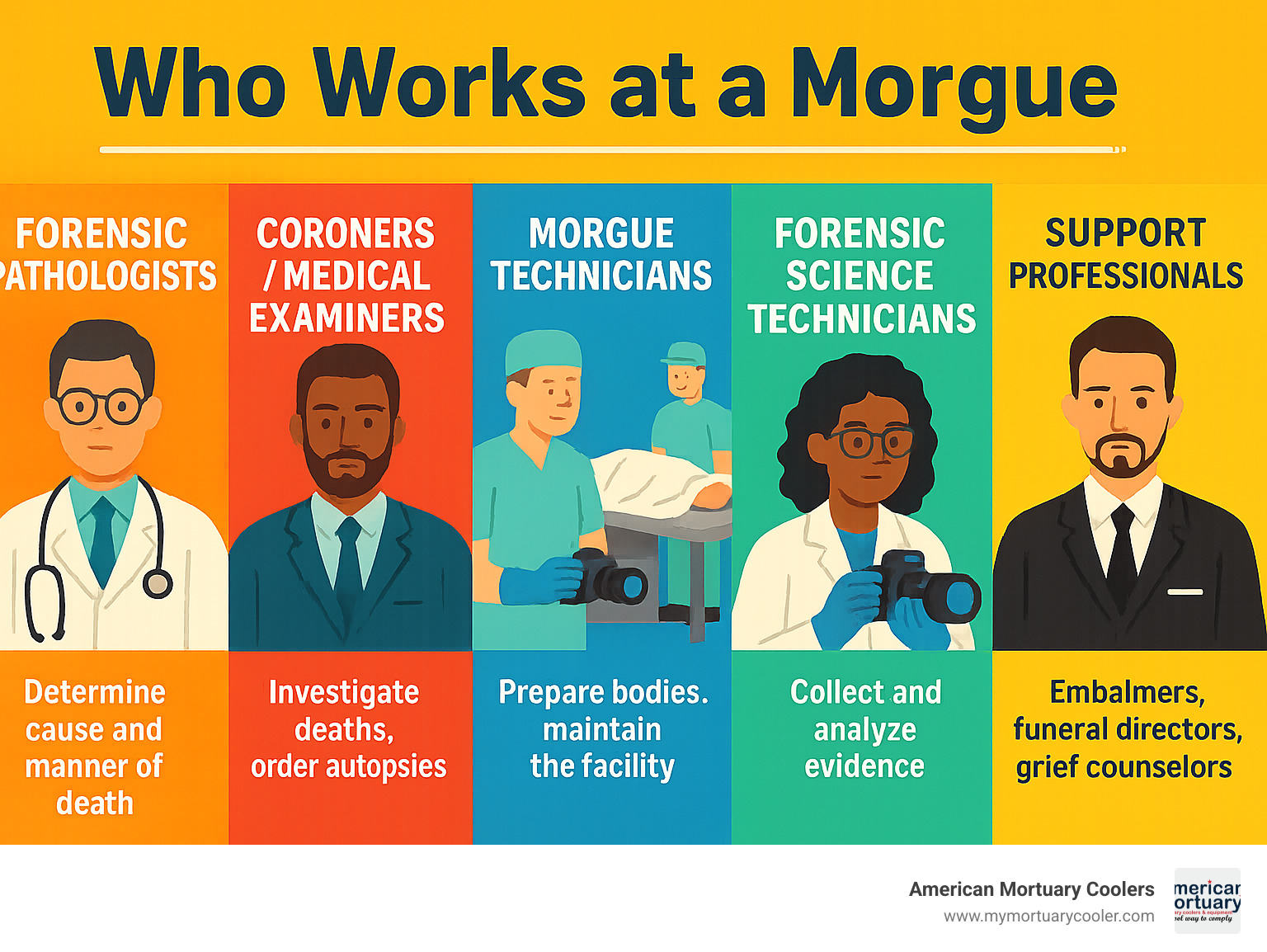
Inside the Modern Morgue: Purpose, Layout & Safety Protocols
Step inside a modern morgue, and you'll find a carefully orchestrated environment where science meets compassion. These sophisticated facilities do far more than store human remains—they serve as critical hubs for medical investigation while providing dignified care during families' most difficult moments.
The heart of any morgue lies in its temperature-controlled storage areas. Positive-temperature coolers maintain a steady 2-4°C (36-39°F), creating the perfect environment to slow decomposition for several weeks. These chambers give families time to make arrangements while preserving remains for identification and investigation.
For longer-term storage needs, negative-temperature freezers operate at bone-chilling -10 to -50°C. These units become essential during complex forensic cases that may take months or years to resolve. We've installed both types of systems across the country, and we know how crucial reliable temperature control is for the professionals who work at a morgue.
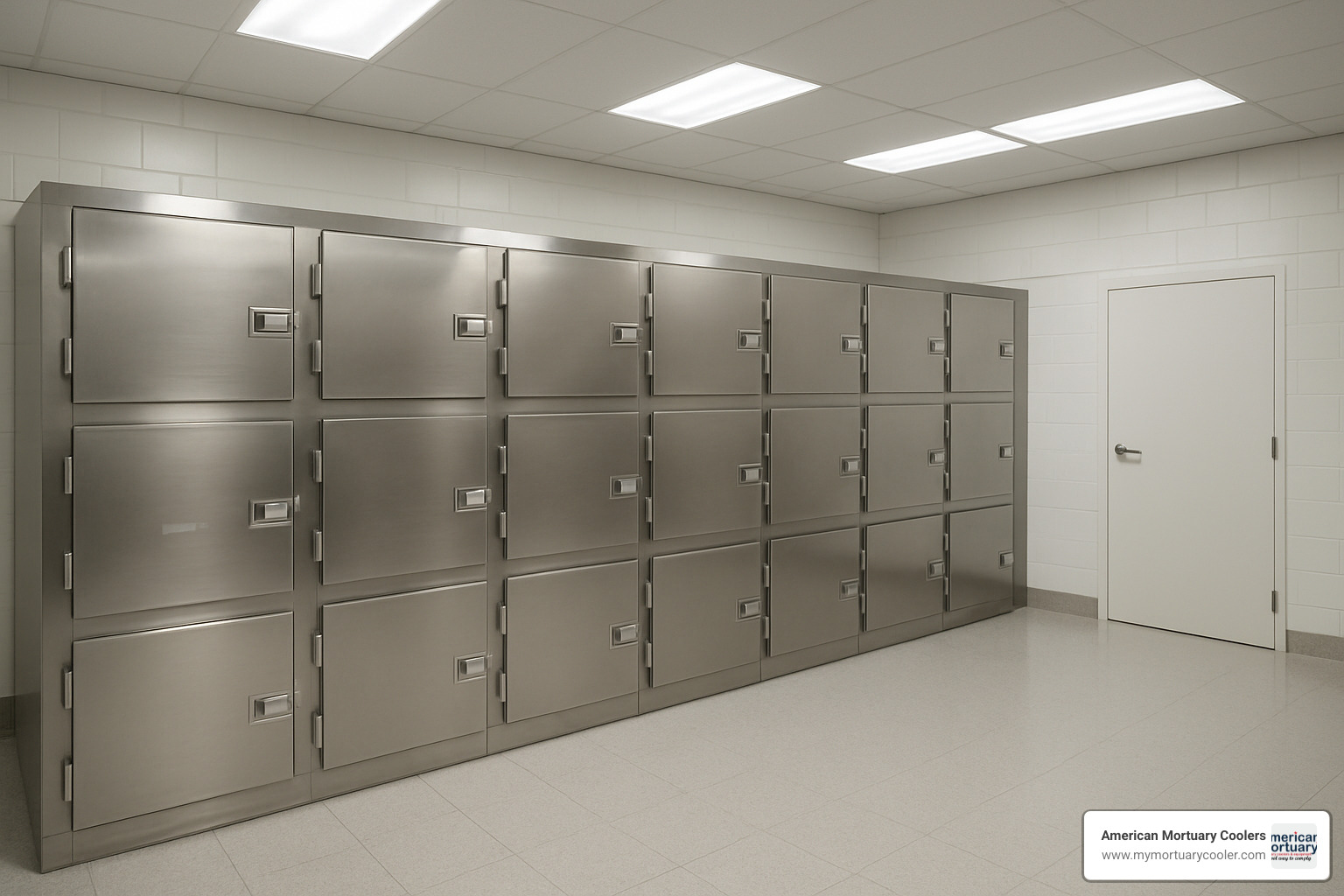
Advanced ventilation systems work around the clock to manage odors and maintain air quality throughout the facility. These systems aren't just about comfort—they're essential for staff health and safety. The specialized equipment we see in modern morgues includes autopsy tables with built-in drainage, hydraulic body lifts for safe transfers, and temperature-controlled specimen storage units.
From our experience installing cooling systems everywhere from small-town funeral homes to major metropolitan medical examiner offices, we understand that each morgue's layout must balance technical requirements with human needs. Families need quiet, respectful spaces for their final goodbyes.
The Morgue Environment 24/7
Unlike most workplaces, morgues never truly close their doors. The refrigeration zones hum continuously, maintaining precise temperatures even when staff go home for the night. Backup generators and redundant cooling systems ensure that a power outage won't compromise the facility's critical function.
The autopsy suite represents the most technically complex area, featuring specialized lighting systems, advanced drainage, and carefully organized instrument storage. Every detail serves a purpose—from the non-slip flooring to the height-adjustable tables that reduce strain on pathologists during lengthy procedures.
Viewing rooms provide a completely different atmosphere. These spaces are designed with families in mind, offering dignified environments where loved ones can make identifications or say final farewells. Soft lighting and comfortable seating help ease one of life's most difficult moments.
When disasters strike, temporary morgues become lifesavers. Ice rinks, refrigerated trucks, and converted public buildings have all served this purpose. The COVID-19 pandemic showed us just how quickly normal capacity can be overwhelmed, with hospitals across the nation relying on refrigerated trucks parked outside as makeshift storage.
Safety & Ethics on the Job
The people who work at a morgue face unique challenges that most of us never consider. Biohazard exposure tops the list of daily concerns, from bloodborne pathogens to infectious diseases. That's why strict OSHA compliance isn't optional—it's absolutely essential for protecting staff health.
Personal protective equipment (PPE) becomes second nature for morgue workers. Gloves, gowns, face shields, and respirators aren't just recommended—they're required. Sharps disposal follows rigid protocols to prevent accidental injuries from scalpels and other medical instruments.
Infection control measures extend beyond basic PPE. Surfaces undergo regular disinfection, air filtration systems remove potential contaminants, and waste disposal follows strict medical protocols. According to scientific research on autopsy safety, proper safety protocols protect both staff members and the integrity of forensic investigations.
But safety isn't just about physical protection. Confidentiality and dignity form the ethical foundation of morgue work. Every person who enters these facilities—whether living or deceased—deserves respect and privacy. Staff members take this responsibility seriously, understanding that they're often the last professionals to care for someone's loved one.
The emotional well-being of morgue workers matters just as much as their physical safety. Many facilities now provide counseling services and peer support programs to help staff process the psychological demands of their work. After all, caring for the dead while supporting the living requires both technical skill and emotional resilience.
Who Works at a Morgue: Core Medical & Investigative Roles
At the heart of every morgue, you'll find dedicated medical professionals working alongside skilled technicians to solve death investigations and provide closure to families. These are the people who make the difficult decisions about cause and manner of death, often under intense pressure from law enforcement and grieving loved ones.
Who works at a morgue in these core roles brings years of specialized training to handle cases ranging from natural deaths to complex homicides. The medical team forms the backbone of the operation, with each professional playing a crucial part in ensuring accurate investigations and respectful care of the deceased.
| Role | Education Required | Average Salary | Primary Responsibilities |
|---|---|---|---|
| Medical Examiner | Medical degree + forensic pathology fellowship | $205,560 | Determines cause/manner of death, performs autopsies |
| Coroner | Varies by jurisdiction (may be elected) | $66,540 | Investigates deaths, orders autopsies, legal authority |
| Morgue Technician/Diener | High school + on-the-job training | $35,000-$50,000 | Body preparation, assists with autopsies |
| Forensic Technician | Bachelor's degree in forensic science | $60,090 | Evidence collection and analysis |
Who Works at a Morgue—Medical Examiner vs Coroner
The difference between medical examiners and coroners might seem confusing, but it's actually quite straightforward. Medical examiners are physicians who've completed specialized training in forensic pathology. They're appointed based on their qualifications and earn around $205,560 annually because of their extensive medical background.
Coroners take a different path entirely. Many are elected officials who don't necessarily need medical training, though about 33% do have some college education. They average $66,540 per year and focus more on the legal and administrative side of death investigation.
In places like New South Wales, Australia, the system is highly organized with four full-time coroners handling the entire coronial system. Here in the United States, the setup varies dramatically from state to state.
For a deeper dive into these fascinating careers, check out our guide on Life After Death: Understanding the Role of a Medical Examiner.
Who Works at a Morgue—Morgue Technicians & Dieners
Meet the unsung heroes of the morgue: the technicians and dieners who keep everything running smoothly behind the scenes. The word "diener" comes from German, meaning "corpse servant," though today's professionals are highly skilled specialists who deserve much more respect than that old-fashioned term suggests.
These dedicated workers earn between $35,000-$50,000 annually and handle the hands-on work that makes autopsies possible. They prepare bodies for examination, set up and sterilize instruments, collect specimens, and maintain detailed chain of custody records. During autopsies, dieners perform the initial "Y" incision, drain body fluids, and carefully remove organs for the pathologist to examine.
The physical demands are real. Most dieners work 12-hour on-call shifts and need strong attention to detail, physical stamina, and emotional resilience. They're lifting, moving, and positioning bodies throughout their shifts, which is why modern morgues invest in specialized equipment to protect their staff.
We've seen how proper equipment makes a difference in our years of working with morgue facilities. Our comprehensive guide to Mortuary Lift Products at Mortuary-Lift.com shows how body lifts and transport equipment protect workers while maintaining the dignity that every person deserves, even after death.
Forensic Science Support Staff
The forensic specialists who work at a morgue bring incredible expertise to solve cases that would otherwise remain mysteries. These professionals often work part-time or on-call, stepping in when their particular skills are needed for complex investigations.
Forensic odontologists become crucial when visual identification isn't possible due to decomposition or trauma. They match dental records with incredible precision, often providing the only way to identify remains and bring closure to families.
Forensic anthropologists work with skeletal remains, reading bones like a book to determine identity, cause of death, and other vital details. Their expertise becomes essential in cases involving remains finded months or years after death.
Forensic entomologists might sound unusual, but they provide critical information by studying insects found on bodies. Different insects appear at predictable stages of decomposition, helping investigators estimate time of death with surprising accuracy.
Radiologists perform X-rays and imaging studies to detect foreign objects, fractures, or other evidence that might not be visible during external examination. Toxicologists analyze blood, tissue, and fluid samples for drugs, poisons, or other substances that could explain unexpected deaths.
The field is growing rapidly, with forensic science technician positions projected to increase by 17% between 2016-2026. These specialists average $60,090 annually and often find the work deeply rewarding, knowing their expertise helps solve cases and provides answers to families desperate for closure.
Support & Specialized Professionals You Might Meet
Beyond the medical professionals conducting autopsies, who works at a morgue includes a dedicated team of specialists who bridge the gap between death investigation and funeral services. These professionals ensure families receive compassionate care while maintaining the highest standards of dignity for their loved ones.
When you visit a morgue facility, you'll likely encounter funeral directors who coordinate services with families, administrative staff managing paperwork and scheduling, and grief counselors providing emotional support during difficult times. Each plays a vital role in the complex process of caring for the deceased and supporting the living.
From Embalming to Cosmetics
Embalmers represent one of the most skilled support roles, earning an average of $42,260 per year. These licensed professionals preserve bodies for viewing and funeral services using specialized knowledge of anatomy, chemistry, and sanitation laws. The embalming process involves carefully replacing bodily fluids with preservative chemicals to slow decomposition and create a peaceful appearance for families.
Working alongside embalmers, funeral cosmetologists (also called desairologists) specialize in preparing the deceased for viewings. While they earn around $29,590 annually on average, those with strong reputations can command significantly higher fees. These skilled artists use techniques similar to theatrical makeup, employing color-matched creams and setting powders to create lifelike, comforting appearances for final goodbyes.
Crematorium technicians operate the specialized equipment required for cremations, which typically take 2.5 to 3 hours as body fluids must completely evaporate. Death doulas provide emotional and logistical support to terminally ill individuals and their families, while memorial celebrants lead culturally appropriate funeral services that honor each person's unique life story.
For detailed information about these preservation processes, read our Practical Guide to Mortuary Embalming and How It Works. Our Beginners Guide to the Mortician: Everything You Need to Know provides comprehensive information about funeral industry careers for those considering this meaningful work.
Beyond the Autopsy Suite
The network of who works at a morgue extends far beyond the facility's walls. Body recovery teams respond to death scenes with specialized training in handling remains with dignity while preserving evidence. Transport drivers safely move remains between facilities, hospitals, and funeral homes, often working irregular hours to accommodate family needs and legal requirements.
Some unique environments require specialized morgue operations. Cruise ships, for example, maintain small morgues with capacity for one to three bodies to comply with maritime law. These compact facilities require specially trained crew members who understand both morgue operations and maritime regulations.
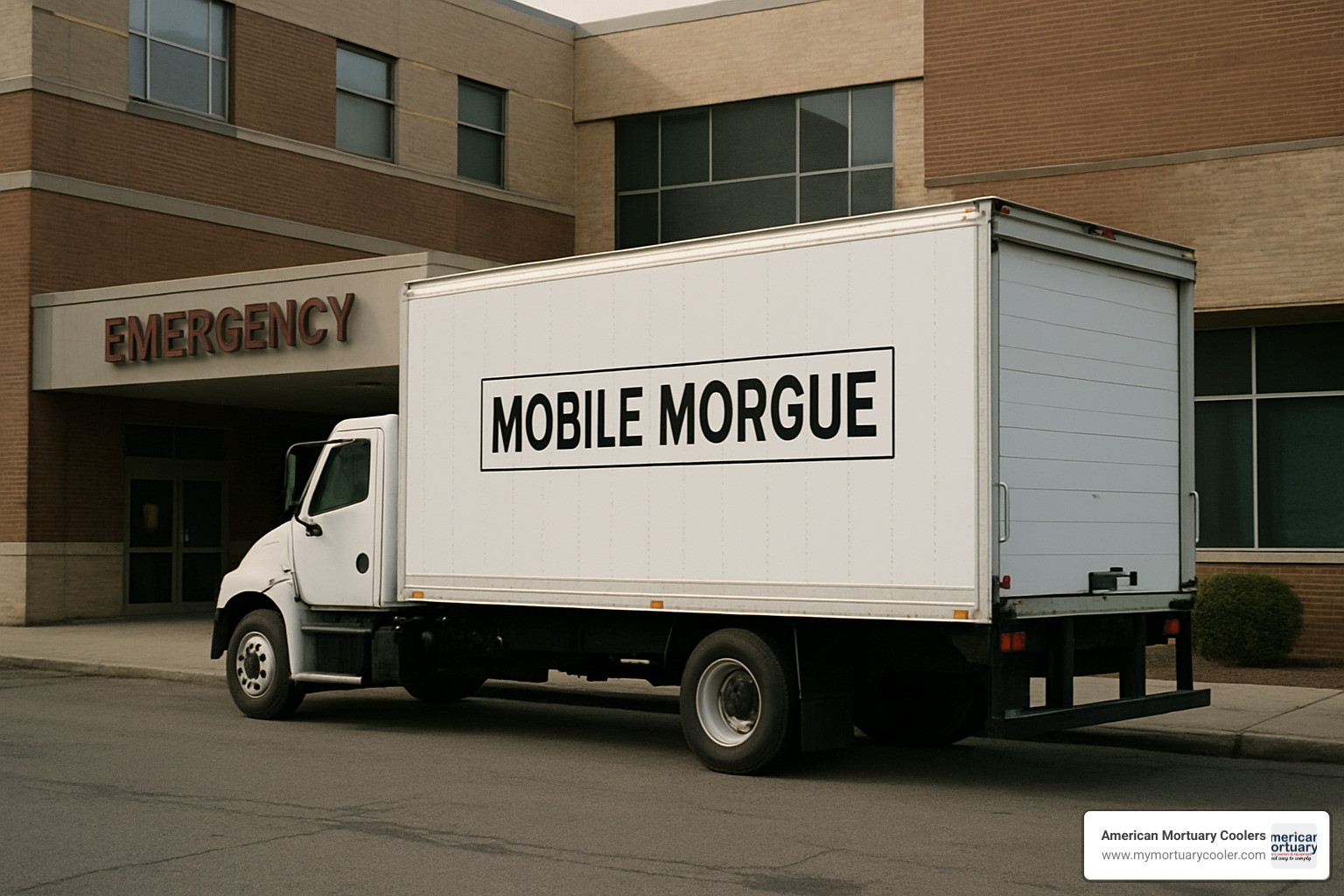
During mass-casualty events, temporary morgue operations require additional specialized staffing. Logistics coordinators manage the complex process of setting up temporary facilities, while security personnel protect the dignity of the deceased and privacy of families. Family assistance specialists provide crucial support during these overwhelming situations, helping coordinate identifications and providing emotional support.
At American Mortuary Coolers, we've worked with many of these professionals over the years, providing the reliable refrigeration systems that allow them to focus on their compassionate work rather than worrying about equipment failures.
Training, Qualifications & Career Pathways
Breaking into morgue work doesn't follow a one-size-fits-all path. The educational requirements range dramatically depending on which role catches your interest—from high school diploma positions for entry-level technicians to extensive medical training for forensic pathologists.
The beauty of this field lies in its accessibility. Many professionals started with basic qualifications and built their expertise through hands-on experience and continuing education.
Entering the Field
Starting as a morgue technician or diener requires surprisingly modest educational credentials. You'll need a high school diploma or GED plus at least six semester hours in relevant subjects like biology, anatomy, physiology, zoology, or criminal justice. Previous laboratory assistant experience gives you an edge, but it's not always required.
Most facilities provide comprehensive on-the-job training lasting one to three months. During this period, experienced staff teach you everything from proper body handling techniques to equipment maintenance and documentation procedures.
Becoming a forensic pathologist demands significant educational commitment. You'll start with a bachelor's degree (preferably in sciences), followed by medical school to earn an MD or DO degree. After that comes a four-year pathology residency and a one-year forensic pathology fellowship. Finally, you'll need board certification to practice independently.
Coroner positions vary widely by jurisdiction. Some require only a minimum high school diploma, while others prefer legal training or law enforcement backgrounds. Whether you're elected or appointed depends on your local government structure.
The path you choose depends on your current situation, career goals, and how much time you can dedicate to education. Many successful morgue professionals started in entry-level positions and advanced through experience and additional training.
For detailed career guidance, see our Comprehensive Guide to Mortuary Affairs Specialist Job Duties. The National Occupational Classification (NOC) provides standardized descriptions for morgue-related occupations across different jurisdictions.
Climbing the Ladder
Career advancement in morgue work offers multiple pathways for ambitious professionals. Senior technician roles often come with supervisory responsibilities, allowing you to mentor new staff while overseeing daily operations.
Specialization opportunities include forensic photography, evidence handling, or toxicology sample processing. These specialized skills make you more valuable and often come with higher compensation.
Some experienced professionals transition into administrative positions overseeing entire morgue operations. Others find fulfillment in teaching roles at mortuary science programs, sharing their expertise with the next generation.
Consulting work provides another advancement option. Experienced morgue professionals often advise funeral homes, medical facilities, or government agencies on best practices and equipment needs.
Salary & Job Outlook
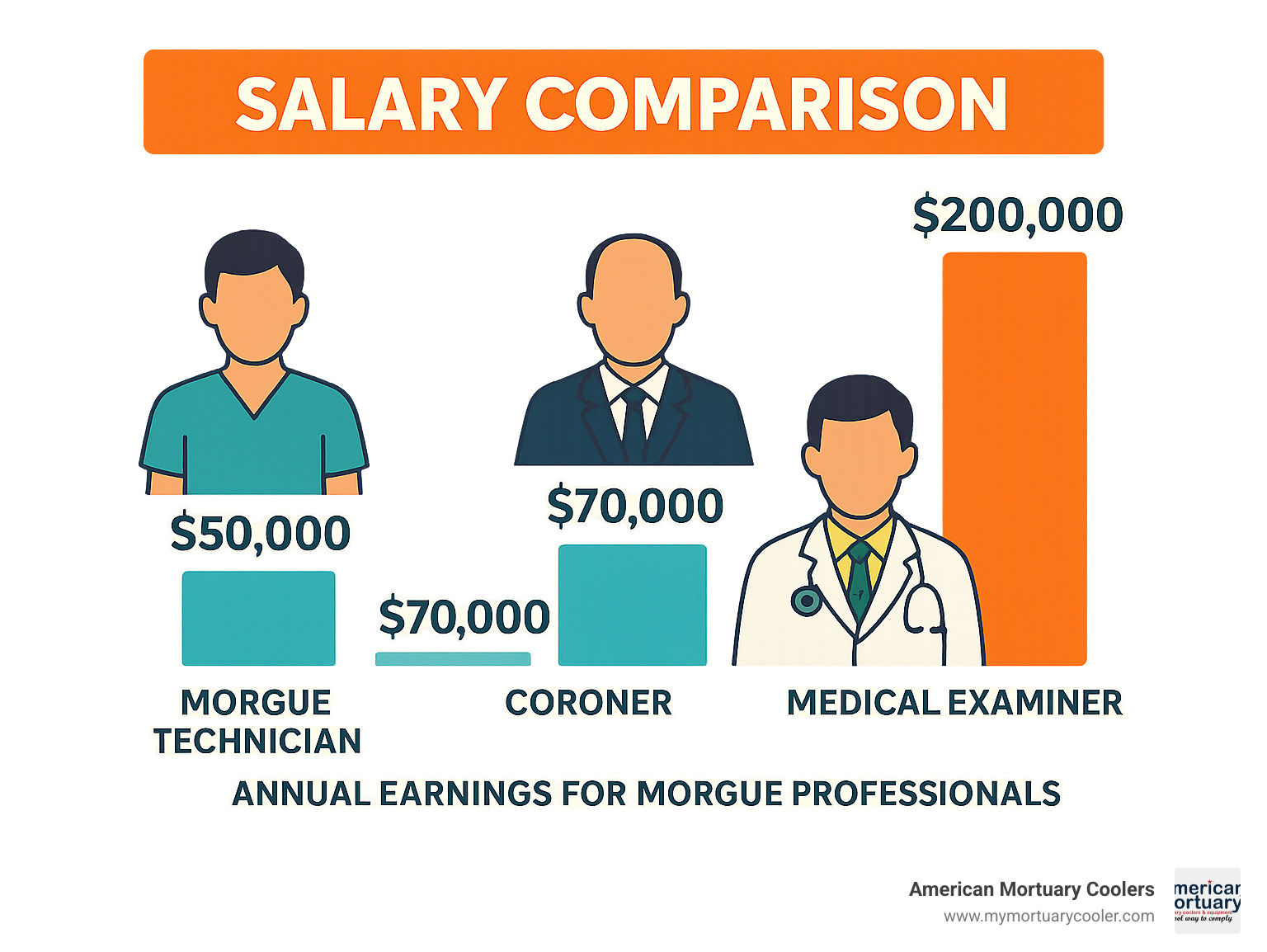
Who works at a morgue can expect competitive compensation that reflects their level of education and responsibility. Physicians serving as medical examiners or pathologists earn the highest salaries at $205,560 on average, reflecting their extensive medical training.
Coroners average $66,540 annually, while forensic science technicians earn around $60,090. Embalmers typically make $42,260 per year, and morgue technicians fall in the $35,000-$50,000 range. Entry-level mortuary assistants start around $32,850, with cosmetologists averaging $29,590.
The job outlook looks promising across the field. Forensic science technician positions are projected to grow 17% from 2018-2028, adding approximately 117,800 new positions nationwide. This growth rate far exceeds most other occupations.
Regional differences significantly impact salaries. Urban areas typically offer higher compensation to offset living costs, while rural positions may provide other benefits like lower stress levels or stronger community connections.
The aging population and increased emphasis on forensic investigation continue driving demand for qualified morgue professionals. Whether you're just starting your career or considering a change, this field offers both job security and the satisfaction of meaningful work.
Work Life: Physical & Emotional Realities
Working in a morgue presents unique challenges that extend beyond technical skills. Staff must steer physical demands, emotional stress, and societal misconceptions about their profession.
Physical Demands
The work involves significant physical requirements including:
- Lifting and moving bodies (morgue technicians handle 2-3 cases daily)
- Standing for extended periods during autopsies
- Exposure to strong odors and bodily fluids
- Risk of injury from sharp instruments and chemicals
One Reddit morgue worker noted that skin lipids absorb morgue odors, which can be released later through perspiration or flatulence - a reality that affects personal relationships and social interactions.
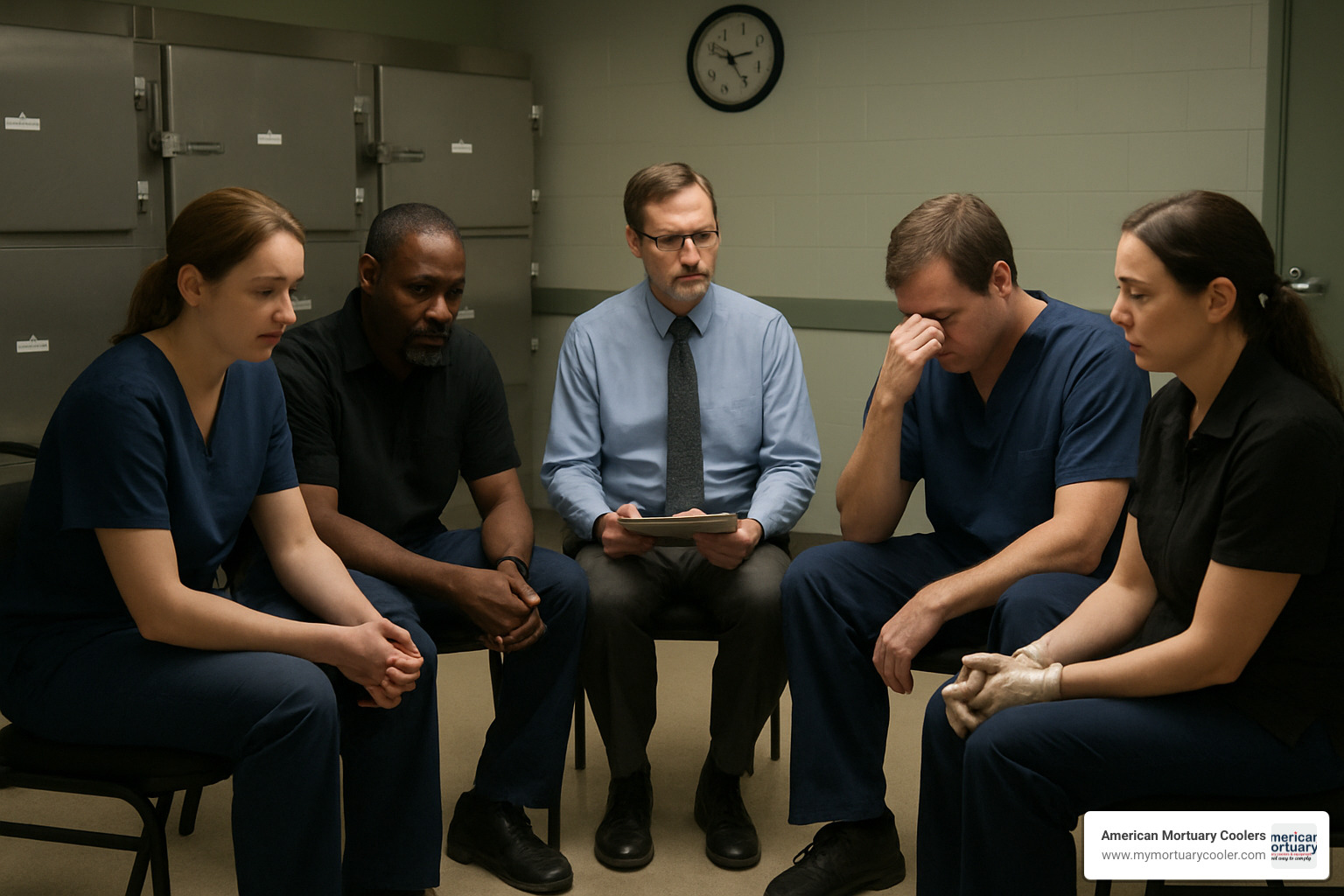
Emotional Challenges
Who works at a morgue must develop coping mechanisms for emotional stress. Particularly difficult cases include:
- Child deaths
- Suicide victims
- Violent crimes
- Personal acquaintances
Staff report that while initial discomfort fades with experience, certain cases never become routine. Support systems are crucial, including:
- Employee assistance programs
- Peer support groups
- Professional counseling services
- Regular debriefing sessions
Staying Resilient
Successful morgue professionals develop strategies for maintaining mental health:
- Emotional Boundaries: Learning to empathize without taking on personal grief
- Stress Management: Using mindfulness, exercise, and hobbies for decompression
- Professional Support: Participating in continuing education and peer networks
- Humor: Maintaining appropriate levity to cope with daily stress
Our guide on The Mind in the Courtroom explores psychological aspects of forensic work.
Frequently Asked Questions About Morgue Careers
People considering careers in death care often have similar questions about qualifications, daily realities, and emotional challenges. Based on our years working with professionals who works at a morgue, here are the most common concerns we hear.
What qualifications do I need to be a morgue technician?
Getting started as a morgue technician doesn't require years of college education. Most positions need just a high school diploma or GED as your foundation. Beyond that, you'll want at least six semester hours of coursework in subjects like biology, anatomy, physiology, zoology, or criminal justice.
Don't worry if you're coming from a different field - laboratory assistant experience helps, but it's not always required. The real learning happens on the job during your 1-3 month training period. During this time, experienced staff will teach you proper handling procedures, safety protocols, and how to operate specialized equipment.
Think of it like learning any skilled trade - you start with basic knowledge and build expertise through hands-on experience. Many successful morgue technicians started with just curiosity about the field and willingness to learn.
How do coroners differ from medical examiners?
This confusion comes up constantly, and for good reason - the roles vary significantly depending on where you live. The main differences come down to training, how they get the job, and what they're paid.
Medical examiners are appointed physicians with specialized forensic pathology training. They've completed medical school, residency, and fellowship programs - which explains why they earn an average of $205,560 annually. These doctors handle complex cases requiring medical expertise to determine cause and manner of death.
Coroners might be elected officials without medical training, though about 33% have associate degrees or some college education. They earn significantly less at $66,540 average, but their role focuses more on overseeing death investigations and coordinating with other professionals. Coroners often delegate actual autopsies to qualified pathologists.
In some jurisdictions, coroners and medical examiners work side by side. In others, you'll find only one type of system. It's worth researching your local area to understand which professionals who works at a morgue in your community.
Is working in a morgue emotionally taxing?
Let's be honest - yes, morgue work presents real emotional challenges. Staff regularly encounter tragic deaths including children, suicides, and violent crimes. These cases affect even the most experienced professionals.
However, most people in the field develop effective coping strategies over time. As one morgue worker wisely shared, "It's not my grief" - learning to maintain emotional boundaries while still providing compassionate care. This doesn't mean becoming cold or uncaring. Instead, it means understanding your role in helping families during their worst moments.
Support systems are absolutely essential for long-term success. This includes employee assistance programs, peer support groups, professional counseling, and understanding from family and friends. Many facilities now provide regular debriefing sessions after particularly difficult cases.
The emotional challenges are real, but so is the sense of purpose many workers find. They're providing dignity in death and helping families find closure during impossible times. That meaning often outweighs the difficulties for people drawn to this important work.
Conclusion
When you think about who works at a morgue, you might picture a solitary figure in a chilly room. In reality, these facilities buzz with teams of dedicated professionals who have chosen careers that truly matter.
From forensic pathologists earning more than $200,000 to entry-level technicians starting around $35,000, morgue work offers meaningful opportunities at every level. The projected 17 % growth in forensic science roles underscores how society increasingly values the people who care for the deceased and support grieving families.
Whether you’re drawn to the detective work of forensic pathology, the hands-on skills of a diener, or the compassionate roles in funeral services, there’s a place for almost any background. Some jobs require extensive medical training, while others welcome individuals with a high school diploma and a willingness to learn.
At American Mortuary Coolers, we’ve spent years supporting these professionals across Tennessee, Georgia, Illinois, South Carolina, Texas, California, New York, and Pennsylvania. Through countless installations and service calls, we’ve witnessed the dignity and compassion these workers bring to their daily tasks.
The work isn’t easy—physical demands, emotional challenges, and social misconceptions are common. Yet morgue professionals consistently tell us their careers provide something rare in today’s job market: deep purpose and genuine meaning.
For facilities seeking reliable equipment, explore our solutions in Hospital and County Morgues: Ensuring Dignity and Efficiency with American Mortuary Coolers.
So the next time someone asks who works at a morgue, you’ll know the answer goes far beyond stereotypes. These are healthcare heroes, scientific investigators, and compassionate caregivers—working together to honor life even in death.




















